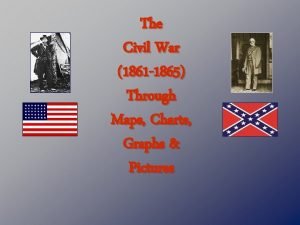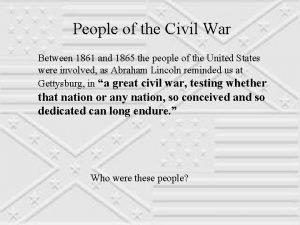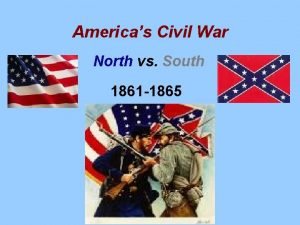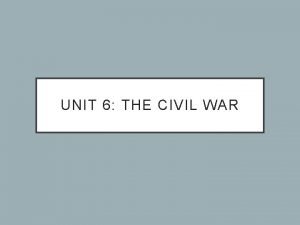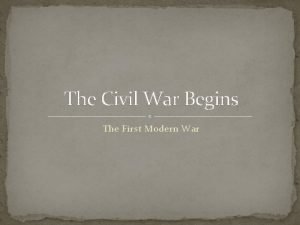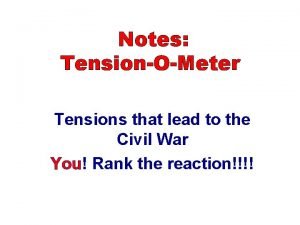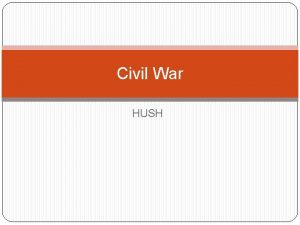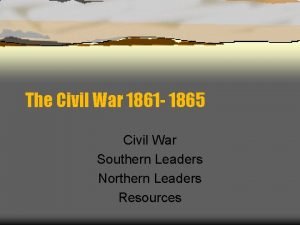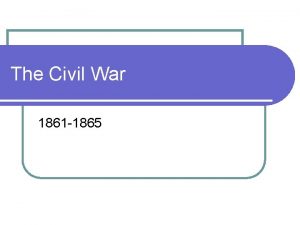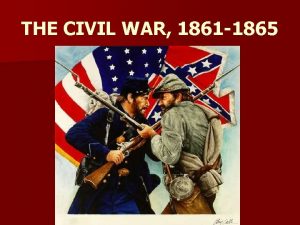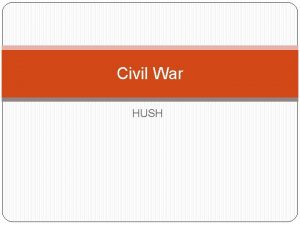1861 1865 The Civil War 1861 1865 North









- Slides: 9

(1861 – 1865) The Civil War (1861 – 1865)

*North vs. South: Advantages and Disadvantages* � - The North obviously had several advantages, such as: � An industrialized market economy that gave the government a tremendous amount of resources to fall back on. � A much larger population and more manpower for the army and navy. Speaking of the navy, the North had a larger, stronger navy. � An already established, relatively powerful and organized central government led by Lincoln. � The support of the liberated/runaway slaves in the South. � - However… � They mainly ended up having to invade “foreign” territory. � They had really crappy generals (especially initially) like Mc. Clellan, Burnside, etc. � To win, they had to invade and conquer the South (fighting an offensive war) – harder. � - The South had some advantages, too: � Fighting on home soil (most of the time) for their independence and way of life. � They had some really good generals like Robert E. Lee, “Stonewall” Jackson, JEB Stuart, etc. � To win, they only had to keep the North out – keep up resistance – like Washington in RW. � - However… � They had a smaller everything: smaller population, smaller army, smaller navy, smaller economy, practically NO industrialization to speak of, and fewer resources. � They had a developing central government and a big time aversion to gov’t power. � Class problems emerging (in North too, but more in South) i. e. yeoman farmers vs. planters.

*General Strategies* � - The Union had the Anaconda Plan from the very start, which hoped to strangle the Confederacy through a blockade and cut it in half by taking the Mississippi. � - The Confederacy only wanted to hang on and keep the Union from gaining control. To do this, they had the foreign policy goal of gaining foreign recognition (esp. Britain). To try to coax the British into supporting them, the South put an embargo on cotton production, but this didn’t work as the British got cotton from other sources. � - In response, the North was very careful in trying to maintain good relations w/Britain. There were only two instances where this was threatened – the Trent affair in 1861 [US boards British steamer, takes off 2 Confederate ambassadors, imprisons and then releases them] and the Alabama issue [Britain selling warships to Confederacy, ambassador protested, Britain stopped]. � - The one area both sides didn’t pay attention to initially was the West. Guerrilla warfare broke out there in 1861, and locations along the rivers in the West would eventually be keys to the North’s victory. Beyond the Mississippi, the Confederacy allied itself w/some Indian tribes.

*The War Begins* � - On December 20, 1860 South Carolina passed a secession ordinance, hoping that other states would follow, which they did [Mississippi, Florida, Alabama, Georgia, Louisiana and Texas all split by February 1861, when the Confederate States of America was formed in Alabama]. � - Then on April 12, 1861 at Fort Sumter Confederate commanders attacked after being notified by Lincoln a ship was arriving to resupply the fort. The fort surrendered, the war began, and four more states joined the Confederacy – Virginia, North Carolina, Tennessee and Arkansas. � - The next battle took place on July 21, 1861 at Bull Run – to the shock of the Union picnickers watching the battle, General “Stonewall” Jackson sent Union troops fleeing back towards Washington. � - In the last half of 1861 the only changes were really made in the sea, where the Union won some coastal victories, setting off a stream of runway slaves in the nearby areas.

*1862: Initial Battles* � - In February 1862 Ulysses S. Grant won some important victories for the Union in the land rivers of Tennessee at the battles of Fort Henry and Fort Donelson. These triumphs opened paths into Tennessee, Alabama and Mississippi. � - Grant continued into Tennessee, fighting the first super-bloody battle of the war, the Battle of Shiloh, on April 6. Neither side won, but casualties for both sides were huge. � - On the Virginia front, Mc. Clellan was stalling for time (not in favor of all out war, liked preparing armies, not using them). Although he was w/in 7 miles of the Confederate capital by June 1, Lee kicked his butt in the Seven Days Battles (June 26 – July 1) and sent him back to the James River. � - Lee’s victory psyched Jefferson Davis up, and he ordered a general offensive (while at the same time calling for the support of the border states). � - But the plan didn’t work, largely b/c of the Battle of Antietam (the bloodiest day of the entire war) on September 17, 1862, where Mc. Clellan turned Lee back out of Maryland (but was subsequently replaced by Lincoln for not going after the enemy more). The South also lost in Tennessee, and had to give up the offensive due to a lack of resources. � - Another noteworthy battle of spring 1862: the Merrimack (Confederacy) vs. Monitor (Union) deal, which is important b/c it was the first clash of ironclad ships (ever).

*The Initial Effects of the War* � - The North changed a great deal during wartime… � Although business was shocked by the advent of the war [relationships w/South terminated, debts lost, etc. ] it soon picked up – especially b/c the gov’t contributed formerly unheard of amounts [and added new taxes, like the first income tax, to make up for it]. The commercialization and industrialization of agriculture received an especially big boost. � Since workers didn’t really benefit as much as their employers did from the new conditions the labor movement gained strength – but the employers fought back, too. Some even made crappy products for the gov’t – i. e. corruption. � Perhaps most importantly: the gov’t gained an activist role in the economy for good. This was solidified by a series of American Systemish acts passed [since no South to oppose]: � Morrill Tariff Act (1861) – doubled former tariffs � Homestead Act (1862) – 160 acres to anyone for 5 years free � Legal Tender Act (1862) – creation of a nat’l currency � Morrill Land Grant Act (1862) – land given to states to sell, but revenue can only go for education [think agricultural, engineering schools]. � Pacific RRD Act (1863) – transcontinental RRD planned � National Bank Act (1863) – I hope this one is self-explanatory � Lincoln’s power also increased – he started a shipbuilding program w/o waiting for Congress, suspended habeas corpus in the border states (first w/o Congress, then w/their approval) and even invoked martial law. � Lastly, Northern women took over jobs left vacant by soldiers. � - And the South experienced even more disruption… � For one, the whole local/limited/states’ rights gov’t idea had to go in order to fight the war properly. Davis moved quickly to bring arms, supplies and troops under his control, and then had to resort to the first ever draft law in April 1862. Davis was a strong executive – he even suspended habeas corpus and imposed martial law where there was opposition. � The government also ended up having big time influence on the economy, b/c of conscription, which allowed them to control labor – RRDs, industries all went under gov’t control. And due to the Union blockade, the South actually started industrializing during the war. � Southern women also had to take over tasks formerly reserved for men (like managing the farm, new jobs, etc. ) – which pleased some women but annoyed others. � Then there was the whole food issue – there just wasn’t enough of it, mainly b/c of labor shortages [other goods were hard to get as well] – tremendous inflation resulted. � Social tensions also increased due to the unfairness of the draft system. �

*Emancipation* � - Wait, what? Slaves? This was a war about slavery? You wouldn’t have guessed it given the way both Lincoln and Davis avoided mentioning the topic for the first months – Lincoln b/c of the border states and Republican Party, and Davis b/c of the class conflicts [not all Southerners had slaves, remember]. � - Lincoln’s refusal to address the issue didn’t go over too well w/blacks and abolitionists, though, so in March 1862 he first proposed that states consider emancipation on their own [aid was promised, as was compensation for slaveholders and colonization of former slaves in Africa]. This colonization scheme stuck around until 1864 – again, not cool w/blacks and abolitionists. � - Some Radicals Republicans (George Julian, Charles Sumner, Thaddeus Stevens), however, had other plans – they created a special House-Senate committee on the war to pressure Congress, and then they pushed 2 confiscation acts through – in August 1861 [slaves used in hostile actions could be seized] and in July 1862 [property of rebels confiscated, so slaves freed in South]. � - But Lincoln stood by his voluntary gradual emancipation deal [Horace Greeley protested this in “The Prayer of Twenty Millions”] until after the Battle of Antiedam. Then, in the famous Emancipation Proclamation, which took effect on New Year’s Day, 1863 (and some say “nothing changes on New Year’s Day”) he freed all the slaves in the states in rebellion against the US. � - The EP was actually more of a threat to the South, and was still sort of ambiguous, the message was clear to many – and it defined the war as one against slavery. It was about time, too! � - The final thing came in June 1864 when Lincoln gave his support for a Constitutional ban on slavery, leading to the Republican Party’s call for the Thirteenth Amendment, which was passed in early 1865. As a rather strange note, near the end of the war the Confederates grew so desperate even they considered emancipating and arming the slaves. Go figure!

*1863: The Decisive Year* � � � � � - The year began well for the South w/the Battle of Chancellorsville, a crushing defeat for the North – but also detrimental to the South b/c of the loss of Stonewall Jackson. - But things went downhill quickly for the South b/c of two important battles: the Battle of Vicksburg [on the last major Southern fortification of the Mississippi] and the Battle of Gettysburg [the high water mark of the Confederate offensive into Maryland]. - The two Northern victories at the above battles were very important. The fall of Vicksburg on July 4, 1863 opened the Mississippi for the North and cut the South in half and the Northern victory at Gettysburg was the end of all Southern offensives. *Disunity in the North and South* - In the North (not as bad): Resentment of the draft was one problem, as was general disillusionment. However, the North had enough resources that the problems didn’t make an impact on the war effort overall. Most resistance, in fact, was political in origin. Some Democrats attempted to gain support by blaming Lincoln for the misfortunes brought about by the war, attacking conscription, and defending states’ rights. These Peace Democrats [led by Clement L. Vallandigham] called Lincoln a dictator [got CV arrested for treason] – which led to Republicans calling them “Copperheads” [implication was that they were trying to sabotage war]. The worst incident of public violence came about against the draft [law in 1863] – the New York City Draft Riots, for example, showed the class and ethnic tensions of the time b/c blacks were the main target [taking jobs]. In the Presidential Election of 1864 the PD’s actually had somewhat of a chance – they ran former General Mc. Clellan against Lincoln. He lost, but still… - In the South (a lot worse): One problem was the planters’ increasing opposition to their own gov’t. The centralizing tendencies needed to maintain the war effort were just not cool – so planters complained about conscription, wouldn’t change to food from cash crops, and were generally inflexible. The food situation, which had never been good, certainly wasn’t getting better. This culminated in the food riots in several Southern cities in spring 1863. Most Southerners resisted less conspicuously, though – by evading taxes and the draft, and by deserting from the army. Davis was not good at communicating w/the public, so he was stuck w/the overriding problem of public apathy/lack of morale, esp. after Vicksburg and Gettysburg. Some Southern legislatures even began to call for peace after V&G – William Holden [no, not the Sunset Bvld/Sabrina/Stalag 17 guy] in North Carolina (summer 1863) and Brown and Stevens in Georgia (1864) – but the movements never got anywhere. Also, the 1863 elections hurt Davis as many supporters of his administration lost seats. Basically, by 1864 the South had given up and many were either doing nothing or actively sabotaging the Confederate gov’t.

*1864 – 1865: The Final Stretch* � - The South could actually have still won in the last year if they had kept up a stalemate and waited for Northern anti-war sentiments to triumph. But several important events swayed things just enough the other way to assure a Northern victory. One aspect was that the North’s diplomatic strategy, which was don’t-let-Europe-recognize-them, succeeded into 1864. � - Also, General Sherman [“War is Hell”] took total war right into the Southern heartland starting in the winter of 1863/1864 in Virginia. The policy was all-out: looting, pillaging, burning…it was all OK. In response, Davis concentrated his forces in Atlanta, Sherman’s first goal. � - On September 2, 1864 Southern forces fell at Atlanta – which boosted Northern morale and secured Lincoln’s reelection, but killed hope for the South. � - After the victory at Atlanta, Sherman took his men on the aptly-named Sherman’s March to the Sea. The goal was, quite simply, to destroy as much as possible – so the men lived off the land ruined as much as they could. Since there was no guerrilla resistance [South gave up] the policy was very successful. � - Simultaneously, Grant attacked Lee’s army in Virginia in repeated attempts to capture Richmond. After enormous losses, Grant was finally successful on April 2 in taking Richmond. Then on April 9, 1865 Lee surrendered at Appomattox Court House [important to note that terms of surrender very lenient].
 Civil war 1861/1862
Civil war 1861/1862 Civil war 1861/1862
Civil war 1861/1862 North and south states civil war
North and south states civil war North vs south civil war comparison chart
North vs south civil war comparison chart North vs south civil war
North vs south civil war North and south states civil war
North and south states civil war Why was the civil war the first modern war
Why was the civil war the first modern war Chapter 16 lesson 2 challenges to slavery
Chapter 16 lesson 2 challenges to slavery Civil rights and civil liberties webquest
Civil rights and civil liberties webquest Tensionometer
Tensionometer
